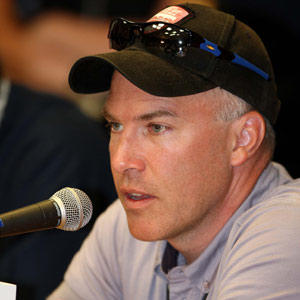
I realize that it's folly to try to humanize businesses. Or to imply that they are something "more." Businesses are, ultimately, simply that. And certainly "purpose" has far too often been used for obfuscation more than anything else. As Stewart Brand so eloquently puts it in The Media Lab: Inventing the Future at MIT, "Information wants to be free. Information also wants to be expensive. [...] That tension will not go away." I think this tension exists more broadly as the tension between purpose and profitability. There's been a fairly seismic shift in corporate leadership over the past year among some of the most influential companies that consider triathletes to be among their primary and most engaged users. The press releases announcing these leadership decisions have all been entirely devoid of purpose and entirely focused on profitability. Perhaps it's simple naivete to find that interesting, or to believe that such tension ever really existed. And yet having been quite involved in the actual business of two of them - Specialized as a sponsored athlete and Zwift as an employee, I can say that passion and purpose ran deep in the veins of the founder-CEOs.
Strava recently announced the hiring of Michael Martin as their new CEO. Martin will replace co-founder Michael Horvath. Martin comes from YouTube, where he ran Shopping for almost two years. Prior to that, he had a long stint at Nike in the Digital Products division. Martin's background - in particular his work at Nike on Nike Run Club - makes him seem like a strong choice. And yet the press release contains virtually no information on Martin's interests as an athlete himself.
This follows a similar trend to Specialized's 2022 announcement of Scott Maguire as CEO and Zwift's 2022 announcement of Kurt Beidler as co-CEO. Maguire came from Dyson, and - as with Martin - the press release is entirely focused on consumer product chops - physical consumer products in the case of Maguire; digital in the case of Martin. Beidler came from Amazon, where he ran the Amazon Kids+ division. I've heard that both are cyclists - Beidler's LinkedIn background features him riding a bike with a race number on his helmet, but I do find it interesting that this wasn't something that the PR teams considered important enough to merit a mention.
IRONMAN is still on the lookout for their new CEO, and I'm very interested to see if they follow the apparent trend of focusing solely on their business as makers of things that people "consume." Given that none of these are public companies, it does feel a bit odd that the press releases read entirely as if they are intended for investors, without much regard for the actual user base.
There are few truly large companies that touch triathlon very directly. The new CEO of IRONMAN will unquestionably have the most direct impact on our sport, but Strava, Zwift, and Specialized are all companies that have had a significant influence on triathlon. Specialized's own on-again-off-again history has had dramatic impact - at least within the professional ranks - when they decide that the sport is no longer an area of real interest. And their impact on the cycling industry more broadly is even more meaningful. Cycling was - and still is - at the very core of both Specialized's founder Mike Sinyard and Zwift's co-founder Eric Min. I don't have the same personal relationship with either of Strava's co-founders, but one need look no further than Strava itself for proof that being active is an integral part of who Horvath (athlete #57!) and Mark Gainey (athlete #10!) are as people. How many miles has Martin ridden or run on Strava? Is that not relevant?
The leadership and direction of these companies matters both because they are not easily replaced and because their size allows them to have uniquely powerful and broad influence. Strava is perhaps the most irreplaceable, and the company whose focus has perhaps the most outsize impact. Strava's massive user base and correspondingly large data set now plays a critical role in helping to define infrastructure projects. Whether and where bike lanes happen is uniquely influenced by Strava. And while there are competitors to Zwift, it remains the brand that truly defined indoor cycling. Both the size of its community and its unique commitment to cycling development with Zwift Academy and - especially - the TdF Femmes avec Zwift also mean that the way in which it choose to grow and evolve and invest has ramifications in ways that other company's decisions simply do not. Specialized is less unique than either Strava or Zwift - there are other equivalent bike companies in ways that there just are not for either of those other two, but it's a major employer, advertiser, and driver of cycling technology. Likewise, Specialized's charitable efforts - through their Outride project in particular - are impactful in ways that are only possible because of Specialized's scale and resources. And IRONMAN, of course, is synonymous with triathlon itself.
While the skills required to found a business are certainly somewhat different from the skills required to help an established business evolve and thrive, I still believe that a passion for the underlying sport - or sports, in Strava's case - is essential. With over 100M users, Strava is certainly more mainstream than Specialized, which is itself more mainstream than Zwift. And yet these are still brands that cater to a very specific type of consumer. In particular, a consumer that I think values knowing that someone is "one of us." While I didn't always agree with every decision Andrew Messick made as CEO of IRONMAN, he was a triathlete. The sport was a part of him as much as he was a part of it. In a 2012 profile, Bicycling wrote of Sinyard that, "Mike is fascinated by bicycles, addicted to them, and expects everyone who works at Specialized to feel pretty much the same." 10 years later, there's no mention of whether the new CEO even rides a bike.
At the risk of delving into politics a bit, there's currently a marked disconnect between how the US economy is doing and how people "feel" it is doing. Some of this is, of course, reflective of a dissonance between certain measures of economic health and activity, and the actual ways that typical consumers are actually impacted. But I think it also speaks to the importance of purpose. And of belief. I was quite curious about Strava's decision to introduce messaging as its latest big feature. And I will admit to chuckling when I saw that the first comment on Strava's official LinkedIn post announcing Martin's hiring was, "First thing to do: drop the messaging function. Focus on your core." Purpose is not ancillary to these businesses. And I don't think it can exist solely as a facilitator and driver of revenue.
It's impossible to say whether things would be different if these were public companies. The death of small and mid-cap companies at the hands of PE and VC groups is well beyond the scope of this article, though I think it is quite clearly relevant. Nor is it all clear either that these new CEOs lack passion for the purpose that led to the founding of the companies they now lead. Based on observable decisions and product direction in the case of both Specialized and Zwift, the businesses are - for the better - essentially unchanged. Specialized still makes great bikes. And Zwift still makes virtual roads that are incredibly fun to ride. I think this also helps to emphasize that we tend to overestimate the actual importance and influence of CEOs, but that's also a topic for another day. But I think we do lose something when the narrative drifts so far from purpose and focuses solely on the business. If there is to be a tension between purpose and profits, it's up to all of us to ensure that we help maintain it.
[photo of Michael Martin © Strava 2023]



